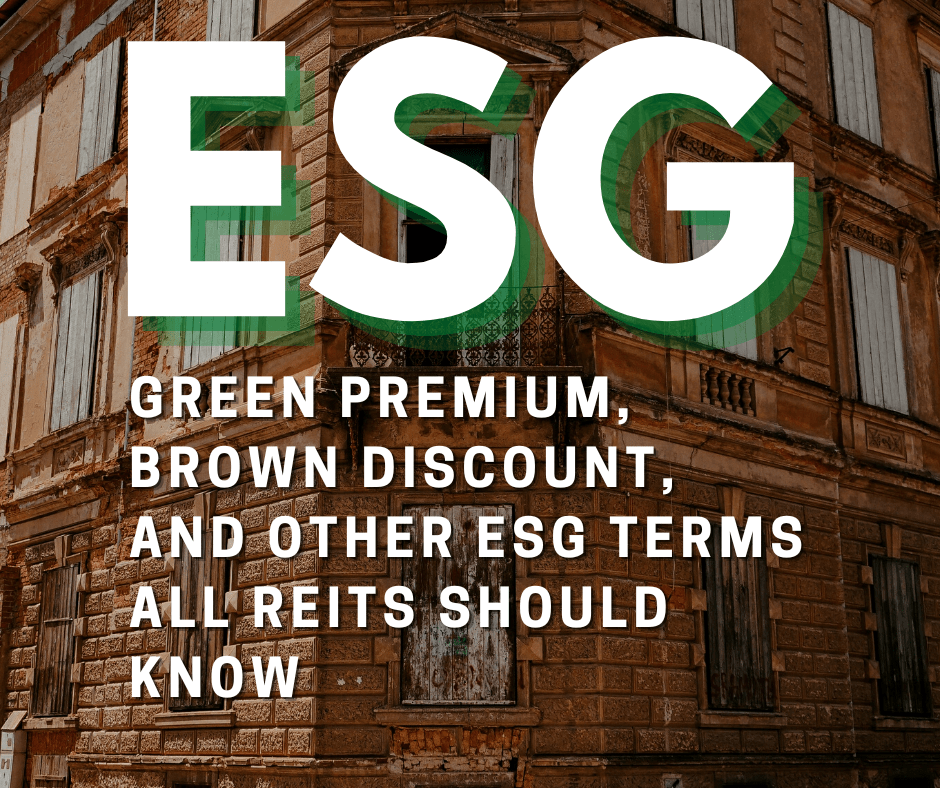3 Aug. 2023

You’re probably no stranger to ESG investing. And with over 5 million Google search results (and growing) for the term, it can sometimes feel like it’s the only thing anyone can talk about. Almost. But in all seriousness, more and more REITs are discovering that putting the planet first can actually be a smart business move.
Yep. It turns out there are big bucks in sustainability. Who knew?! Well – we did. But there’s nothing interesting or helpful about saying I told you so. So instead, we thought we’d explain some of the most important ESG terms you should know but probably don’t. And hey – no judgment. The transition to ESG is a journey, and we’re all learning.
Here’s the thing, as popular as ESG investing has become, there’s still a lot of unnecessary hype, jargon and BS around, and that just confuses things. Well, you’ll be glad to know that this stops today. Right here. With this blog post, we take a deep dive and look at 5 terms every REIT considering ESG investing should know.
ESG stands for environmental, social and governance. When applied to investing, this is an approach which emphasizes ESG issues. It’s often used interchangeably with socially responsible investing or sustainable investing. The driving force behind ESG investing is that increasingly financial performance is linked to environmental, social and governance factors. Some estimates suggest that ESG investing could reach $1 trillion by 2030.
This score measures how well real estate meets medium to long-term risks and opportunities related to ESG factors. A strong score indicates an ability to manage ESG risks well compared to peers. Scores range from 0 – 100, with a score of less than 50 considered poor, while more than 70 is an excellent score. These scores are calculated by third parties that specialize in ESG scoring. Some organizations that can evaluate a building’s ESG quality score include Bloomberg ESG Data Services, Dow Jones Sustainability Index, MSCI ESG Research, Sustainalytics, and Thomson Reuters ESG Research Data.
Made popular by Bill Gates, this term refers to the additional cost involved in choosing a green technology over one that emits more carbon emissions. It can be tricky to calculate green premiums as there are often many assumptions about the costs of zero-carbon alternative solutions. While green premiums aren’t an exact science, they’re a great place to start. They’re an indication of where you are in your climate change journey and of how much work still needs to be done. The higher a green premium, the further away you are from a carbon-free future.
When applied to real estate, the green premium refers to green-certified buildings that will be more expensive to rent or buy. And this makes sense. These buildings tend to be more profitable. There are studies which indicate that on average green buildings have a 6% rent premium and a sales premium of over 7%. In other words, green-certified buildings have higher rents, better leasing and better overall performance.
Buildings that aren’t sustainable will be hit with a brown discount. This means that a building’s value will depreciate. Another way to put this is that a building’s value will be discounted (i.e. it will lose its value). Brown discounts can be as high as 30% and can severely impact a real estate portfolio. With more focus on green, sustainable buildings, brown discounts will become increasingly popular. To remain viable, older buildings will require retrofitting to avoid these brown discounts.
These are buildings which balance carbon emissions with carbon removal. Simply put, net-zero buildings don’t emit carbon from construction or operation. With these buildings, emissions are reduced as much as possible with things like smart climate tech solutions. Renewable energy and carbon offsets are also used to balance emissions. While a large part of the transition to net-zero buildings is about rethinking how we design and construct new buildings, retrofitting existing buildings will also play an important role as we prepare for a low-carbon future.
There’s a lot of overwhelm when it comes to ESG investing. But it doesn’t have to be this way. When one looks past the jargon and the marketing hype, it’s easy to envision a greener future. But it’s more than that. ESG investing is so much more than just a smart choice for the environment. It’s also a powerful opportunity for REITs to reach their financial goals.
So, You Want to learn more about ESG investing for your REIT?
Get it while it’s hot >>> https://www.setpoint.ai/contact-us/